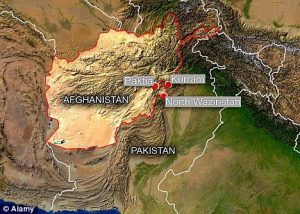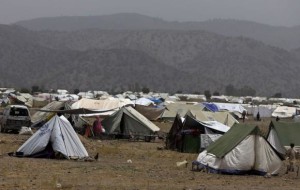Newspaper Article 07/07/2014
It is refreshing that Pakistan and Afghanistan have decided to develop a ‘robust and effective’ bilateral border-coordination mechanism as part of efforts to deal with cross-border attacks, as well as to arrest the movement of terrorists. Last month the two sides had agreed to establish a Joint Working Group on Security aimed at strengthening bilateral security cooperation. This agreement was reached after high-level talks between senior military officials from the two countries held at the General Headquarters (GHQ) in Rawalpindi on July 03. Afghan delegation was led by Director General Military Operations (DGMO), Major General Afzal Aman, with representatives from National Security Council, military intelligence and border police. Pakistani side was headed by DGMO, Major General Aamer Riaz.
It was a follow-up meeting on Afghanistan’s National Security Adviser Dr Rangin Dadfar Spanta’s visit to Pakistan. Spanta came to Pakistan after PM Nawaz Sharif’s Special Envoy Mehmood Khan Achakzai visited Kabul earlier last month. During his visit, Achakzai had sought Kabul’s cooperation to tighten security along the border in order to stop militants running out of North Waziristan from entering Afghanistan.
During the meeting, both sides came up with the commitment to not to allow their respective lands to be used for attacks against each other as well as against the other neighbouring states. Delegations agreed to build further trust, and continue to talk under all circumstances.
During the DGMO level meeting, a detailed briefing was given to the Afghan delegation on border coordination. The issue of terrorists’ sanctuaries in Kunar and Nuristan province of Afghanistan and attacks from those sanctuaries on Pakistan border villages and security posts came under discussion. Afghan delegation was told that Pakistan only fires back in self-defence, when Pakistani border posts are physically attacked or fired upon by terrorists from Afghan territory. Kunar and Nuristan provinces are located in the northeast of Afghanistan and have a border with Pakistan in the east. These provinces are mountainous or semi-mountainous terrain and serves as safe haven for terrorists, especially those fleeing from NWA. Pakistan is sincerely pursuing the military operation in NWA to target all types of terror groups, this has been amply highlighted by categorical statements of the government leaders that the offensive to eliminate hideouts in NWA will target all militants, including the Haqqanis, the demand for which has always been made by Kabul as well as the occupation forces in Afghanistan.
The issue of terrorists’ sanctuaries in Kunar and Nuristan province of Afghanistan and attacks from those sanctuaries on Pakistan border villages and security posts came under discussion. Afghan delegation was told that Pakistan only fires back in self-defence, when Pakistani border posts are physically attacked or fired upon by terrorists from Afghan territory. Kunar and Nuristan provinces are located in the northeast of Afghanistan and have a border with Pakistan in the east. These provinces are mountainous or semi-mountainous terrain and serves as safe haven for terrorists, especially those fleeing from NWA. Pakistan is sincerely pursuing the military operation in NWA to target all types of terror groups, this has been amply highlighted by categorical statements of the government leaders that the offensive to eliminate hideouts in NWA will target all militants, including the Haqqanis, the demand for which has always been made by Kabul as well as the occupation forces in Afghanistan.
Two sides have ruled out any possibility of hot pursuit inside the territories of either country and that they would respect sovereignty and territorial integrity of each other. Both countries have agreed to work closely; and Pakistani side has also asserted that they would work with the new Afghan government cordially and play their positive role for a peaceful and smooth transition of power in Kabul.
A Foreign Office official termed the visit of Afghan security officials a positive development and an important confidence-building measure to remove mistrust between the two neighbors. The official said that it was Pakistan’s initiative to invite security officials from Afghanistan to address their long-standing concerns. He further added that Pakistan had made it abundantly clear to Afghan authorities that the current administration in Islamabad wanted to increase cooperation with Kabul. It is a rare opportunity for the two sides to cooperate with each other in eradicating terrorism. The ball is in Afghanistan’s court. Afghanistan has yet to give any firm assurance whether it would initiate any action against TTP sanctuaries on its soil.
Almost concurrent with the passage of “Protection of Pakistan Bill (PPB) by Pakistan’s National Assembly, Afghan President has also signed a law aimed at curbing the financing of terrorist group; a measure needed to save Afghan banks from being put on an international blacklist. Together with the anti-money laundering law that was signed last week, the legislation will help persuade the international financial watchdog that the Afghan government is serious about combating financial crimes. Lax financial regulations and porous borders are main underlying enablers that facilitate sustenance of terrorist networks.
Now as Pakistan is doing the arduous job of confronting the terrorists head-on, it is regrettable that Afghanistan has almost totally rejected the demand to take any action against Mullah Fazlullah and instead has vowed to continue to play host to him at the cost of disruptive activities in Pakistan.  It is time that Afghanistan should show grace, maturity and far-sightedness by wholeheartedly cooperating with Pakistan. It is time to coordinate policies and strategies of the two countries to weed out terror once for all. The negative response of Kabul could be interpreted as a sort of encouragement to militants, who are threatening the prospects of durable peace in the region. Peace in the two countries is indivisible, and therefore, Afghanistan must respond positively to the demand for stern action against those who are misusing Afghan soil for anti-Pakistan activities.
It is time that Afghanistan should show grace, maturity and far-sightedness by wholeheartedly cooperating with Pakistan. It is time to coordinate policies and strategies of the two countries to weed out terror once for all. The negative response of Kabul could be interpreted as a sort of encouragement to militants, who are threatening the prospects of durable peace in the region. Peace in the two countries is indivisible, and therefore, Afghanistan must respond positively to the demand for stern action against those who are misusing Afghan soil for anti-Pakistan activities.
For the military, without public backing and a political consensus, a major operation in North Waziristan is not sustainable. Prime Minister Nawaz Sharif, backed by a political consensus, had opted to give talks with the TTP a chance, but it did not work. Given the fact that Pakistan’s armed forces are among the best trained and counterinsurgency hardened in the world, the outcome of the operation is not in doubt. North Waziristan will return to the state’s control, and foreign and local terrorists will be captured or killed, unless some escape to Afghanistan. As a result, despite a blowback, the long-term capacity of terrorists to strike elsewhere in Pakistan will be disrupted.
The Afghans have been reassured that the military’s directive was to act against all foreign and local terrorists without any distinction. It was requested that the Afghan National Army and Border Police seal the border on their side to facilitate the elimination of terrorists attempting to escape, and initiate immediate measures to eliminate TTP terrorists and their sanctuaries in bordering areas. Hamid Karzai telephoned Nawaz Sharif to assure all cooperation; but later specified seven sub-conditionalities, some of which are non-starters.
For Pakistan, apart from external circumstances over which it has no influence, the fundamental issue in confronting terrorism has been to achieve a joint public, political and military will to mount an all-out, full spectrum attack. The significance of the North Waziristan operation is that a turning point has been reached and it represents the determined start of a process. As Pakistan rises to the challenge, it will emerge stronger and receive more respect.
Amid fears of Afghanistan’s faltering political transition, US secretary of state John Kerry has called President Karzai and asked him to address the concerns of individual candidates vying to succeed him. Kerry stressed the importance of national unity and a peaceful political process during his call. He encouraged the Independent Election Commission to conduct a full and thorough review that ensures that Afghan people have confidence in the integrity of the electoral process, the spokesperson said. “While the US does not support any individual candidate, we have long stated our support for a credible, transparent and inclusive process that is broadly supported by the Afghan people and which produces a president who can govern the country,” the spokesperson added. The two candidates are at loggerheads, triggering fears that the election results could lead to protests and uncertainty in Afghanistan.
Under the circumstances it is in the interests of the two countries to manage their border in a professional manner. Once this mother of evils is tackled, the cross border movements would be put under effective check and as a consequence incidents of terrorism would taper down.
The Nation, July 07, 2014.
Disclaimer: Views expressed are of the writer and are not necessarily reflective of IPRI policy.

